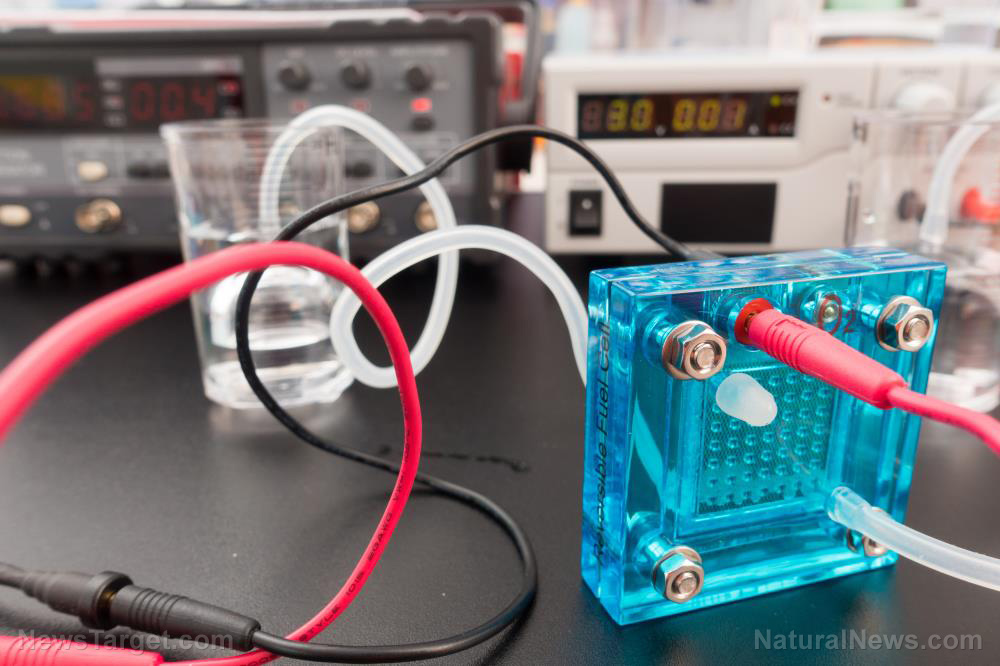What will it take for green energy to overtake fossil fuels as our main source of power?
06/17/2019 / By Edsel Cook

Japanese researchers from three prestigious academic institutions took a hard look at the kind of technology needed by the hydrogen-based green energy industry to successfully compete with the fossil fuel energy industry. They estimated that Japan needs a new generation of cheap rechargeable batteries to produce clean, renewable fuel at cost-effective rates.
Aside from the technology levels, the joint study also considered the economic efficiency of hydrogen production systems. These systems get their energy from solar farms and store excess electricity in rechargeable batteries.
Supported by the National Institute for Materials Science (NIMS), the University of Tokyo (UTokyo), and Hiroshima University, the study might one day set guidelines for the local renewable power generation industry.
In recent years, Japan has been trying to boost its renewable energy output. However, efforts have run into challenges such as instability in green energy generation systems and low ratios of yearly energy capacity.
Back in September 2014, Japanese power companies refused to accept applications from providers of renewable energy. Almost four years later, Kyushu Electric Power Company suppressed the electrical power coming from solar power farms. (Related: New research simplifies the process of harvesting solar energy to generate fuels.)
Clean energy is much more expensive than dirty fossil fuel
Japanese researchers investigated two types of systems that might resolve these problems. One approach employs rechargeable batteries to store excess electricity produced by renewable energy systems.
When the need for additional power arises, the batteries release their stored energy. They can fulfill increased demand for energy even during times when the source of renewable energy proved insufficient, such as nighttime or bad weather crippling solar farms.
The other approach uses power-to-gas (P2G) production systems. This approach uses renewable energy to produce hydrogen gas.
Hydrogen may be burned onsite to generate electricity for distribution through the local power grid. It may also be transferred into container vessels and shipped to other locations, much like its fossil fuel counterparts.
Both battery-based and hydrogen-based approaches share the same problem – they cost too much to run. The sheer expense makes it very difficult to implement green energy systems on a large scale.
Combining rechargeable battery storage systems with hydrogen fuel production
The Japanese research team came up with a design that integrates both rechargeable batteries and hydrogen production technologies. Their system exerts accurate control of the charging and discharging of batteries. It also regulates the level of electrolysis that breaks down water into oxygen and hydrogen according to the amount of solar power.
The next step for the researchers was analyzing the economic viability of their integrated battery storage-hydrogen production system. They looked at factors like the capacities of rechargeable batteries and electrolyzers, which affected the expense of producing hydrogen. If the currently available examples did not meet the requirements for cost-efficiency, the researchers turned their eyes to future advancements in technology.
One example involved rechargeable batteries. Other researchers are developing new designs that discharge electricity at low rates. The most significant advantage of these batteries is cost – they are much cheaper to manufacture than existing units. They are expected to enter commercial service in the 2030s.
Once these affordable batteries become available for use in their integrated system, the joint research team believed that Japan would be able to produce a cubic meter of hydrogen at the cost of 16 to 25 U.S. cents (17 to 27 yen).
The researchers will follow up on this evaluation by figuring out the tech levels for the components needed by their integrated system. They plan to set target values for research and development teams. They also want to determine if the system can work if its output is being suppressed or restricted.
Sources include
Tagged Under: Clean Energy, energy, environ, fossil fuels, goodtech, green energy, green living, hydrogen, hydrogen fuel, power, power grid, renewable energy, research, science and technology, solar power
RECENT NEWS & ARTICLES
COPYRIGHT © 2017 SOLARPANELS.NEWS
All content posted on this site is protected under Free Speech. SolarPanels.news is not responsible for content written by contributing authors. The information on this site is provided for educational and entertainment purposes only. It is not intended as a substitute for professional advice of any kind. SolarPanels.news assumes no responsibility for the use or misuse of this material. All trademarks, registered trademarks and service marks mentioned on this site are the property of their respective owners.



















